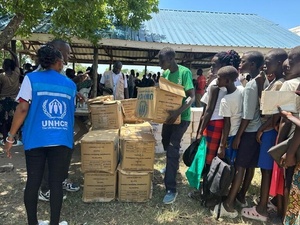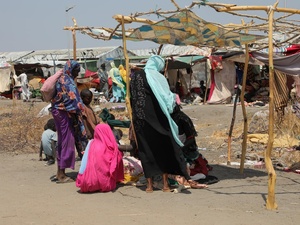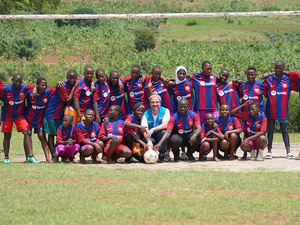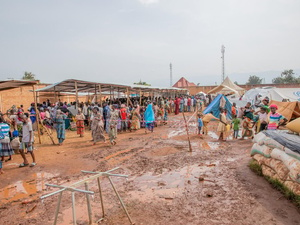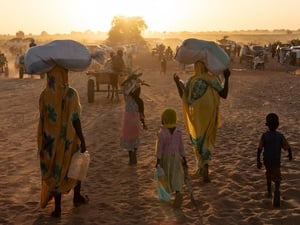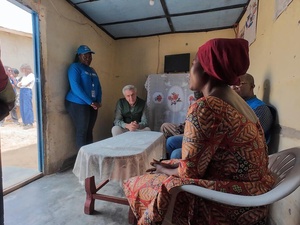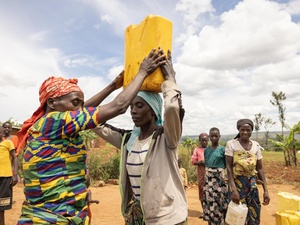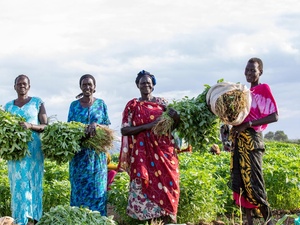Uganda launches Co-convenorship and Roadmap to the second Global Refugee Forum
Uganda launches Co-convenorship and Roadmap to the second Global Refugee Forum
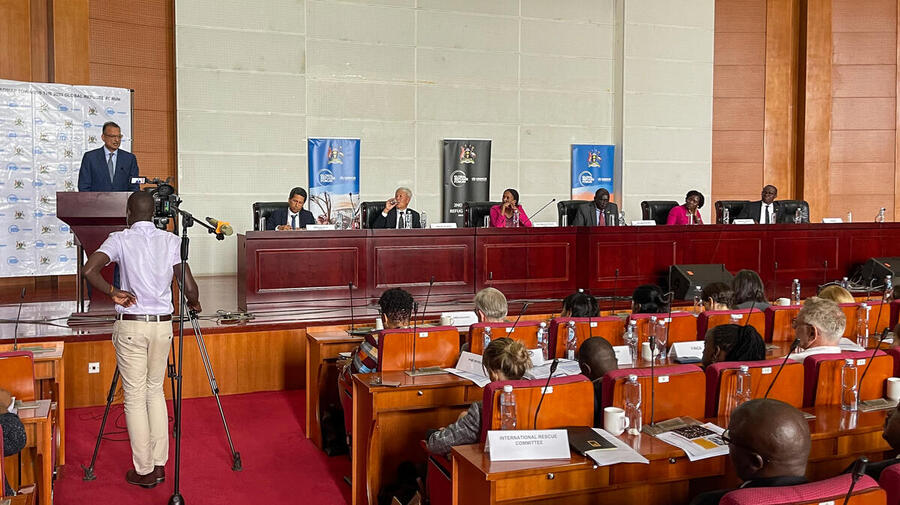
Arafat Jamal, Coordinator for the Second Global Refugee Forum making remarks at the launch of the Uganda roadmap towards the Global Refugee Forum [GRF] in Kampala under the theme, UGANDA, THE WORLD'S MODEL FOR THE REFUGEE RESPONSE - LET'S MAKE IT SUSTAINABLE.
KAMPALA - The Government of Uganda, through the Office of the Prime Minister, and the United Nations High Commissioner for Refugees (UNHCR), the UN refugee agency, launched the Uganda roadmap towards the Global Refugee Forum (GRF) in Kampala under the theme "Uganda, The World's Model for the Refugee Response - Let's Make It Sustainable".
Uganda will be a co-convenor at the second Global Refugee Forum which will take place in the second week of December 2023.
The GRF is the largest global international gathering on refugees. It is a forum where States and other actors come together every four years to share good practices and contribute with financial support, technical expertise, and policy changes to help reach the goals of the Global Compact on Refugees (GCR) which was endorsed in September 2018 by the UN General Assembly with four main goals.
These goals include easing pressure on refugee host countries, enhancing refugee self-reliance, expanding access to third-country solutions, and supporting conditions in countries of origin for return in safety and dignity.
“In times of dwindling humanitarian resources, and in the spirit of International responsibility sharing under the Comprehensive Refugee Response Framework, we call upon all existing and future stakeholders in the Uganda country refugee response, to support and engage in the roadmap towards the December 2023 Global Refugee Forum and also to make commitments at the Global Refugee Forum that will change the lives of refugees and the host community in Uganda,” said Helen Bugaari,Director of the Comprehensive Refugee Response Framework said at the launch “That way, we shall be working together towards impactful durable solutions for refugees.”
Uganda’s preparation for the GRF is centered around five priority areas, including increasing resilience and self-reliance for refugees, taking action against climate change, sharing responsibility rather than shifting duty, localizing the refugee response by strengthening the role of national responders, and building lasting achievable and impactful solutions for refugees.
“Uganda’s policy of welcoming refugees with open arms has provided a lifeline for thousands of people fleeing conflict and persecution,” said Honourable Hillary Onek, the minister for Relief, Disaster preparedness, and Refugees “We believe that refugees are not only entitled to safety from persecution, but also to a dignified, self-sufficient life that provides them with opportunities to improve their situations. Refugees in Uganda are part of the local communities to an extent that exceeds many other countries,” said Onek.
The Government of Uganda and all partners in the Uganda refugee response will prepare for the co-convenorship with a series of events that will begin in April 2023. They include:
• Roundtables on the priority areas - the inclusive and participatory roundtables will assess the current refugee situation, follow up on previous pledges and commitments, and provide an opportunity for stakeholders to make new pledges. The roundtables will start in April 2023 chaired by the government at the ministerial level.
• Regional symposium - In June 2023, a regional conference will take place to focus on Uganda’s approach to hosting refugees and discuss regional solutions to situations of forced displacement.
• Engagement around the humanitarian and development linkage - the government will organize a meeting for humanitarian and development partners to discuss the financing of the humanitarian and development needs, and put a spotlight on improving conditions for asylum in Uganda.
• Pre-GRF conference - towards the end of 2023, there will be an ambassador-hosted national discussion to generate new pledges.
• Follow-up on 2023 GRF - the Government will convene a meeting to assess the pledges received at the forum.
“We extend our gratitude to the government of Uganda for their continued generosity in hosting 1.5 million refugees and asylum seekers. We cannot ignore the fact that the refugee situation in Uganda is faced with a lot of challenges. We call upon stakeholders to make more pledges and interventions to ensure that the needs of refugees are met and that they are able to live in dignity and safety,” said Matthew Crentsil, the UNHCR Uganda Country Representative.
Uganda is currently hosting 1.5 million refugees and asylum seekers, making it the largest refugee-hosting country in Africa and the third largest globally. Most of these refugees are from South Sudan and the Democratic Republic of Congo, with others from Burundi, Somalia, Ethiopia, and other countries.
Despite Uganda’s commendable efforts to provide sanctuary to those fleeing conflict and persecution, the Uganda refugee response remains underfunded. This has had a significant impact on the health and well-being of refugees, as well as on the environment, water and sanitation, education, and livelihood. Additionally, inadequate funding has hampered the efforts to provide quality education and skills training to refugee children and adults, hindering their ability to build sustainable livelihoods and become self-reliant.
Despite the challenges, the Uganda government and partners in the refugee response remain committed to providing protection and assistance to refugees and asylum seekers and they have implemented several progressive policies to this end. For example, refugees in Uganda continue to enjoy the right to work, move freely, and access basic services such as healthcare and education plus the adoption of a localized approach to the refugee response which aims to empower local communities and institutions to lead and participate in the humanitarian response.
For more information, please contact:
Joyce Babirye, Office of the Prime Minister - [email protected] +256752693689
Frank Walusimbi, UNHCR Uganda- [email protected]. +256772701140


